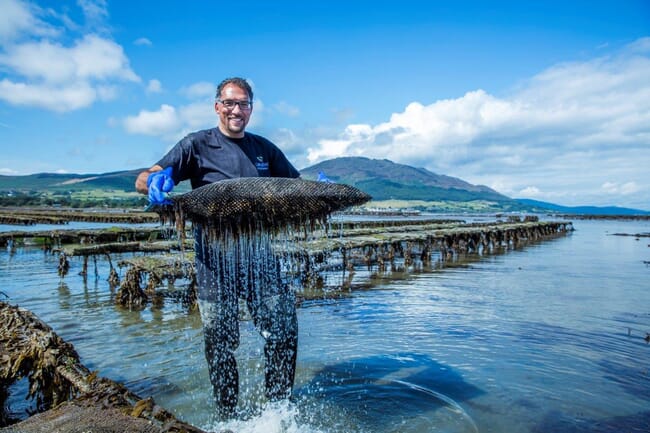
© Carlingford Oyster Company
The award-winning Carlingford Oyster Company has improved efficiencies and the quality of its harvest following an investment of more than €500,000 in new machinery and production facilities.
The company, which has been producing oysters in Carlingford Lough for 50 years, invested €535,000 in upgrading its facilities with the support of a €142,000 grant under the Brexit Sustainable Aquaculture Growth Scheme, implemented by Bord Iascaigh Mhara (BIM).
Founded in 1974 by Peter and Anne Feisser, who arrived at the Lough by a wooden yacht, the flourishing family-run business now produces 250 tonnes – roughly 2.5 million oysters – annually. Peter, now aged 86 and enjoying a well-earned retirement, can still be seen helping with the operations whilst his son Kian runs the business.
According to Kian the recent investment has resulted in significant improvements to the operational efficiencies of the company.
“The premises were built in 1992 and it was a big open space and we really needed to upgrade,” said Kian in a press-release announcing the development.
“Oyster farming is very labour intensive and the investment was designed to make the company more competitive, and to secure the livelihoods of our team and my family,” he added.
Using the investment, the company added new depuration tanks with cutting edge water skimming technology to mitigate the risk of Norovirus; a forklift, a pallet truck, a new water grader, and floating oyster growing bags.
“The work [also] included extending our production facility, adding equipment to help us segregate and grade oysters and improvements in the dispatch areas. Modernising our working environment has supported us meeting the evolving requirements of food safety inspectors, and the expectations of our customers when visiting our premises,” Kian explained.
“All of these machines have helped us not only improve efficiency and working conditions, but they have also helped improve the quality of our oysters and therefore our customer satisfaction,” he added.
The company, which at peak production employs 30 locals, currently caters mostly to UK markets, but following the investment Kian plans to increase their trade with the European sector.
“Without the support of BIM and the Brexit funding we would not have been able to achieve all we have under this investment, and we are very grateful. The future is certainly looking bright,” he said.




